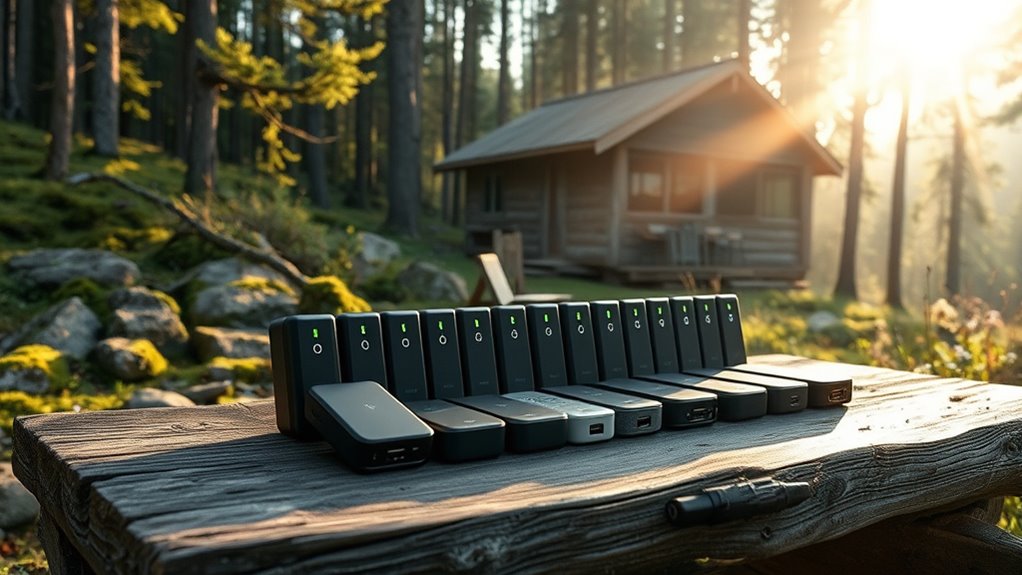If you’re looking for the best battery banks for off-grid cabins in 2025, I recommend models with capacities from around 88Wh to 300Wh that support multiple recharging options like solar and AC. Devices like MARBERO, GENSROCK, and Powkey offer portable designs, reliable power outputs, and safety features to keep your power steady. Keep in mind, the right choice balances capacity, recharging flexibility, and durability—if you continue exploring, you’ll find options perfectly suited to your remote retreat.
Key Takeaways
- Prioritize high-capacity power banks (above 150Wh) with multiple output options to support essential devices in remote cabins.
- Ensure compatibility with solar panels and multiple recharging methods for flexible, eco-friendly energy sourcing.
- Choose portable, durable units with safety features like BMS and rugged design for outdoor and long-term use.
- Opt for units with fast recharging capabilities, such as USB-C PD, to minimize downtime in off-grid environments.
- Consider long cycle life and warranties to ensure reliable, sustainable power during extended off-grid living.
MARBERO Portable Power Station (88.8Wh, 150W Peak)

If you’re looking for a compact and lightweight power solution for off-grid cabins, the MARBERO Portable Power Station is an excellent choice. Weighing just 2.27 pounds and measuring 6.12 x 3.69 x 4.19 inches, it’s easy to carry with its ergonomic handle. Its 88.8Wh lithium-ion battery supports up to 68 hours of runtime and provides 150W peak power. Equipped with multiple ports—including AC outlets, USB-A, USB-C, and a DC car port—it can charge phones, tablets, laptops, and small appliances simultaneously. Its durable ABS shell, cooling vents, and safety protections guarantee reliable, safe use during outdoor adventures or emergencies.
Best For: outdoor enthusiasts, campers, and emergency preparedness individuals seeking a portable, lightweight power source for small electronics and devices.
Pros:
- Compact and lightweight design (2.27 lbs, 6.12 x 3.69 x 4.19 inches), easy to carry with ergonomic handle
- Multiple charging ports including AC outlets, USB-A, USB-C, and car port for versatile device compatibility
- Built-in safety features such as BMS, cooling vents, and automatic shutdown ensure reliable and safe operation
Cons:
- Limited capacity (88.8Wh) may not be sufficient for longer power demands or larger appliances
- Solar recharging can be slow and may require additional equipment not included in the package
- Maximum continuous output of 100W may restrict usage with higher power devices
EnginStar Portable Power Station 300W (296Wh) Battery Bank

The EnginStar Portable Power Station 300W is an ideal choice for off-grid cabin owners seeking reliable, portable backup power. Weighing just 6.5 pounds, it packs 296Wh of capacity and offers a 300W AC output, perfect for charging laptops, phones, and small appliances. It features two 110V pure sine wave outlets, USB-C, and regulated DC ports, supporting over 1,000 charge cycles. Charging options include solar, wall outlet, or car socket, with full recharge in about 7 hours. Its ETL certification and advanced protections ensure safety and durability, making it a dependable power companion for your remote retreat.
Best For: outdoor enthusiasts, off-grid cabin owners, and emergency preparedness individuals seeking reliable portable power for small devices and appliances.
Pros:
- Lightweight and portable at only 6.5 pounds, easy to carry for outdoor activities.
- Multiple charging options including solar, wall outlet, and car socket for versatile recharging.
- Certified safety features with ETL approval and advanced battery management system for reliable operation.
Cons:
- The battery level indicators may not always be fully accurate.
- Limited to 300W AC output, which may not suit high-power appliances.
- Full recharge time is approximately 7 hours, which might be longer compared to some faster chargers.
Portable Power Bank with AC Outlet, 24000mAh External Battery Pack

A portable power bank with a 24,000mAh capacity and an AC outlet is an excellent choice for outdoor enthusiasts, travelers, and anyone living off-grid. It supports charging multiple devices like laptops, phones, tablets, and cameras, with a 65W AC outlet and various USB ports. Compact and lightweight at just 1.6 pounds, it includes a foldable solar panel for eco-friendly recharging. Designed for outdoor use, it features built-in protections and a flashlight. While ideal for small loads and emergency power, it’s best suited for portable electronics rather than high-power appliances. Its versatility makes it a reliable companion in remote environments.
Best For: outdoor enthusiasts, travelers, and off-grid users needing portable power for small electronics and emergency use.
Pros:
- Compact, lightweight design weighing only 1.6 pounds for easy portability
- Supports multiple devices simultaneously with diverse output ports including AC, USB, and DC
- Includes a foldable solar panel for eco-friendly recharging and outdoor convenience
Cons:
- Limited to devices under 65W, not suitable for high-power appliances or large electronics
- Some users experience slow charging of certain devices or compatibility issues with laptops
- Safety concerns have been raised due to reports of battery malfunctions or explosions
Portable Power Station 56000mAh with AC Outlets and Fast Charging

Designed for outdoor enthusiasts and emergency preparedness, the DaranEner Portable Power Station 56000mAh delivers reliable backup power with its impressive 179.2Wh capacity and fast-charging capabilities. Weighing just 6.2 pounds, it’s small enough to carry easily but powerful enough to run laptops, lights, fans, and small appliances under 300W. It features seven ports, including a 60W Type-C and two AC outlets with a pure sine wave. The LiFePO4 batteries guarantee safety and durability, supporting over 3,500 cycles. With quick recharge options—AC, car, or solar—it’s perfect for camping, RV trips, or home backup, ensuring you stay powered wherever you go.
Best For: outdoor enthusiasts, campers, RV travelers, and emergency preparedness individuals seeking a lightweight, reliable portable power source for small appliances and devices.
Pros:
- Compact and lightweight design weighing only 6.2 lbs for easy portability
- High-capacity 179.2Wh LiFePO4 battery with over 3,500 cycles ensuring durability and safety
- Multiple charging options including AC, car, and solar, with fast-charging capabilities for quick recharges
Cons:
- AC port charging speed limited to approximately 21W, which is slower than wall outlets
- USB-A charging power (around 7W) may not qualify as fast charging for some devices
- Some devices may auto-shutdown below 30% battery; requires adjustment for continuous use
Portable Power Station with 97Wh Lithium Battery and Solar Charging

If you’re seeking a reliable, portable power source for off-grid cabins or outdoor adventures, this 97Wh lithium battery station is an excellent choice. Weighing just 3.5 pounds and compact enough to carry easily, it supports fast charging via wall, car, or solar panel (not included). With multiple outputs—including USB A, USB C, AC, DC ports, and wireless charging—it can power up to six devices simultaneously, like phones, laptops, and small appliances. Its built-in LED flashlight and safety features make it perfect for emergencies. Overall, it’s a versatile, lightweight option for reliable backup power during camping, travel, or power outages.
Best For: outdoor enthusiasts, campers, and emergency preparedness individuals seeking a lightweight, versatile portable power source for charging multiple devices off-grid or during power outages.
Pros:
- Compact and lightweight design (3.5 pounds) for easy portability
- Supports fast recharging via wall, car, or solar panel (solar panel not included)
- Multiple output options including USB A, USB C, AC, DC, and wireless charging for versatile device compatibility
Cons:
- Some users have reported issues with handle breakage or button failures
- Limited capacity (97Wh) may not power larger appliances for extended periods
- Occasional safety concerns and rare incidents of fire hazards highlight the need for careful use
Powkey Portable Power Station with AC Outlet (24000mAh/88.8Wh)

The Powkey Portable Power Station with AC Outlet is an excellent choice for off-grid cabins where reliable, portable energy is essential. Its compact design packs 24,000mAh/88.8Wh capacity, powering smartphones, tablets, and even laptops with a 110V/65W AC outlet. Recharging is quick—about four hours via a wall outlet or with a car charger—plus it’s compatible with solar panels (not included). The LED display keeps me updated on battery levels, and safety features like UL certification and Multi-Protect guarantee my devices stay protected. It’s perfect for emergencies, camping, or backup power in remote cabins.
Best For: outdoor enthusiasts, campers, and remote cabin owners needing reliable portable power for devices and small appliances.
Pros:
- Compact and lightweight design for easy portability and storage.
- Multiple charging options including AC outlet, car charger, and solar compatibility.
- Safe and reliable with UL certification and multi-layer protection systems.
Cons:
- Limited to 88.8Wh capacity, suitable mainly for small devices and short-term use.
- Not included solar panel requires additional purchase for solar recharging.
- May need frequent recharging for extended use in off-grid situations.
HOWEASY 120W Portable Power Bank with 24000mAh Battery Backup

The HOWEASY 120W Portable Power Bank stands out as an ideal solution for off-grid cabins needing reliable, versatile energy backup. With a 24,000mAh (88Wh) capacity, it can power almost any device—laptops, phones, lights, even small appliances—thanks to its eight output ports, including USB, USB-C, DC, and AC outlets. Its compact, lightweight design (just 2.3 lbs) makes it easy to carry, and it offers flexible recharging options: AC, solar, or car socket. The smart LCD display keeps me informed of remaining energy and activity, while the built-in LED flashlight with SOS mode adds emergency value.
Best For: outdoor enthusiasts, campers, and emergency preparedness individuals needing reliable, portable power for multiple devices in off-grid or emergency situations.
Pros:
- Versatile with 8 output ports including AC, USB, and DC for powering various devices simultaneously
- Compact, lightweight design with a handle for easy portability
- Multiple recharging options: AC, solar, and car socket for flexible charging in different environments
Cons:
- Solar panel not included, requiring an additional purchase for solar recharging
- Limited to 120W AC output, which may not support larger appliances
- The size, while portable, might still be bulky for very tight space constraints
Portable Power Station 99.9Wh Power Bank

A Portable Power Station 99.9Wh Power Bank stands out as an ideal choice for outdoor enthusiasts and emergency preparedness, thanks to its compact size and high-capacity lithium-ion battery. Measuring just 6.4 x 3.2 x 1.9 inches and weighing 1.65 lbs, it’s highly portable for camping, travel, or backup power. It supports multiple devices simultaneously through seven versatile ports, including AC, USB-C, and Type-C PD 60W. With safety features like overload protection, automatic shutdown, and a digital display, it’s reliable and user-friendly. Perfect for powering phones, laptops, small appliances, and even drones, it’s a versatile tool for off-grid and emergency use.
Best For: outdoor enthusiasts, travelers, and emergency preparedness individuals seeking a compact, reliable power source to charge multiple devices on the go.
Pros:
- Highly portable with a lightweight, compact design suitable for travel and outdoor activities
- Supports multiple devices simultaneously with a variety of versatile output ports, including fast-charging Type-C and AC outlets
- Equipped with safety features such as overload protection, automatic shutdown, and a digital display for easy monitoring
Cons:
- Solar charging is slow and mainly suitable for emergency recharging rather than regular use
- Limited 99.9Wh capacity may not support high-power appliances or extended usage for larger devices
- Battery cycle life, while over 1000 cycles, may still require eventual replacement for long-term heavy use
Westinghouse 155Wh Portable Power Station & Solar Generator

If you need reliable, portable power for outdoor adventures or emergency backup, the Westinghouse 155Wh Portable Power Station & Solar Generator is an excellent choice. Weighing just 3.75 pounds, it’s compact, durable, and easy to carry with a solid handle. It supports charging up to nine devices simultaneously—smartphones, laptops, lights, and even CPAP machines—making it versatile for camping, tailgating, or home emergencies. With a 150W peak power output, it runs silently and cleanly without fumes or noise. Fully rechargeable in about six hours via wall, car, or solar panels, it’s a dependable, eco-friendly energy source wherever you need it.
Best For: outdoor enthusiasts, emergency preparedness users, and anyone needing portable, silent power for multiple devices on the go.
Pros:
- Lightweight and compact at only 3.75 pounds, easy to carry and transport
- Supports charging up to nine devices simultaneously, including phones, laptops, and CPAP machines
- Quiet, clean power with no fumes or noise, suitable for indoor and outdoor use
Cons:
- Limited battery capacity (155Wh) may not power larger devices or extended use
- Some users have experienced issues with battery durability or contact disconnection over time
- Not compatible with all CPAP models, and additional solar panels are optional but may increase overall cost
MARBERO Portable Power Station 88Wh Camping Lithium Battery

For anyone seeking a portable power solution that’s lightweight and easy to use in outdoor or emergency situations, the MARBERO Portable Power Station 88Wh Lithium Battery stands out. Its compact size—just 6.5 x 4.6 x 3.1 inches—and weight of around 3.2 pounds make it highly portable. Designed with a sturdy ABS case, ergonomic handle, and multiple cooling vents, it’s perfect for camping, road trips, or backup power. It offers 88Wh capacity with various outlets, including USB, USB-C PD, AC, and car DC, supporting fast recharging via wall, car, or solar panels in about 7-8 hours. Its safety features guarantee reliable, secure operation wherever you go.
Best For: outdoor enthusiasts, campers, and emergency preparedness users seeking a lightweight, reliable portable power source for small devices and appliances.
Pros:
- Compact and lightweight design for easy portability
- Multiple output options including USB, USB-C PD, AC, and car DC
- Fast recharging capabilities via wall, car, or solar panels within 7-8 hours
Cons:
- Some users report issues with faulty car charger adapters incompatible with cigarette lighter sockets
- Limited capacity of 88Wh may not power larger appliances for extended periods
- Possible malfunctions after prolonged use, such as power cutoff or blinking indicators
Renogy 72000mAh 12V Power Bank with 60W PD

The Renogy 72000mAh 12V Power Bank with 60W PD stands out as an excellent choice for off-grid cabins that need reliable, high-capacity power on the go. Its 266Wh capacity supports charging multiple devices simultaneously, including laptops, phones, and CPAP machines. The 60W PD USB-C ports deliver fast, efficient power, while wireless charging adds convenience. Built for durability, it features a rugged design and safety protections against overcharge and short circuits. With quick recharging options like solar or USB-C, it’s perfect for extended outdoor use. Many users rely on it for emergency backup, camping, and powering essential devices during extended off-grid stays.
Best For: outdoor enthusiasts, campers, and off-grid cabin users seeking a reliable high-capacity power source for multiple devices and essential appliances.
Pros:
- High-capacity 266Wh battery supports multiple device charges and long-lasting power for CPAPs and laptops
- Fast recharging options via solar panel or USB-C ensure quick turnaround for extended outdoor use
- Rugged design with safety features provides durability and protection against overcharge and short circuits
Cons:
- Heavier and bulkier, which may be less ideal for hiking or backpacking trips
- Not TSA-approved, limiting air travel convenience
- Limited simultaneous charging ports (USB-C and DC cannot be used at the same time)
INIU 100W 25000mAh Power Bank with Digital Display

The INIU 100W 25,000mAh Power Bank with Digital Display stands out as an ideal choice for off-grid cabins needing reliable, portable power. Known for SAFE Fast Charge technology, INIU supports high-speed charging up to 110W and can recharge devices like MacBook Pros and Galaxy S24 Ultra quickly. Its compact design uses advanced TinyCell and HyperStack tech, making it the smallest high-capacity charger available. With a clear digital display and a 3-year warranty, it offers peace of mind and versatility for multiple devices, including smartphones, tablets, and laptops. It’s perfect for keeping your essentials powered in remote settings.
Best For: those needing a compact, high-capacity power bank for reliable, fast charging of multiple devices during off-grid trips or remote work scenarios.
Pros:
- Supports high-speed charging up to 110W for multiple devices simultaneously.
- Compact design utilizing advanced TinyCell and HyperStack technology for portability.
- Digital display provides real-time info on battery status and charging performance.
Cons:
- May be more expensive than lower-capacity power banks.
- Requires a 1.4-hour recharge time, which may be inconvenient if used frequently.
- Limited to 3-year warranty, which might be shorter than some competitors’ coverage.
MARBERO Portable Power Bank with AC Outlet

If you need reliable power to keep your devices running off-grid, the MARBERO Portable Power Bank with AC Outlet is an excellent choice. It packs a 24,000mAh lithium-ion battery, offering a peak output of 120W/110V, perfect for laptops, smartphones, tablets, and cameras. Its compact size (4.6 x 3.1 x 6.5 inches) and lightweight design (2.29 pounds) make it portable and easy to carry. With multiple USB ports, an AC outlet, and a DC port, it handles various devices. Recharging takes about five hours via AC or solar, making it versatile for outdoor adventures, emergencies, or off-grid living.
Best For: outdoor enthusiasts, travelers, and emergency preparedness individuals who need a reliable, portable power source to charge multiple devices off-grid.
Pros:
- High capacity of 24,000mAh provides prolonged power for various devices
- Includes an AC outlet and multiple USB ports for versatile device charging
- Compact and lightweight design enhances portability for travel and outdoor use
Cons:
- Heavier than some other portable power banks, which may affect portability
- Charging via solar panels is not included, requiring additional equipment for solar recharging
- Limited to devices below 80W, restricting use with high-power appliances
GENSROCK Portable Power Bank with 24,000mAh and 150W AC Outlet

For anyone needing a compact, reliable power source off the grid, the GENSROCK Portable Power Bank stands out with its impressive 24,000mAh capacity and 150W AC outlet. It’s perfect for camping, emergencies, or travel, supporting devices like smartphones, laptops, drones, and cameras. With eight output ports and five charging options—including AC, solar, and car—you get versatility and convenience. Its lightweight design (2.3 lbs) and compact size make it easy to carry around. The digital display keeps you informed of energy levels, and safety features protect your devices. Plus, its durable battery and long cycle life guarantee dependable power whenever you need it.
Best For: outdoor enthusiasts, travelers, and emergency preparedness individuals who need a reliable, portable power source for multiple devices in off-grid or power outage situations.
Pros:
- High-capacity 24,000mAh battery provides extended power supply for various devices
- Multiple output ports (including AC, USB, and DC) offer versatile charging options
- Compact, lightweight design (2.3 lbs) makes it easy to carry and store
Cons:
- Solar panel recharging option requires an additional purchase (not included)
- Limited to 150W peak output, which may not support higher wattage devices
- Longer recharging times depending on the power source and method
Powkey 200W Portable Power Bank with AC Outlet

When seeking a portable power solution that can handle sensitive electronics and provide stable energy during outdoor adventures or emergencies, the Powkey 200W Portable Power Bank with AC Outlet stands out. It offers 146Wh capacity, two AC sockets, USB ports, and a DC outlet, capable of powering devices like laptops, lights, and small appliances under 200W. Its pure sine wave output ensures smooth, noise-free operation, perfect for electronics that need stable power. Weighing just 3.3 pounds and compact enough to carry easily, it’s designed for versatility, whether camping, RV trips, or backup at home. Recharged in 5-6 hours via multiple methods, it’s a reliable, portable energy source.
Best For: outdoor enthusiasts, emergency preparedness, and travelers needing a portable, stable power source for sensitive electronics.
Pros:
- Pure sine wave AC output ensures smooth, noise-free operation for delicate devices
- Compact and lightweight design (3.3 pounds) for easy portability
- Multiple charging options (wall, car, solar) and versatile device compatibility
Cons:
- Some users experience early product failure and limited warranty support
- AC ports drain battery faster than USB ports, reducing overall runtime under heavy loads
- Durability concerns and difficulty obtaining replacements after warranty expiration
Factors to Consider When Choosing a Battery Bank for Off‑Grid Cabin

When selecting a battery bank for an off-grid cabin, I consider several key factors to guarantee it meets my needs. These include power capacity, port options, recharging methods, safety features, and how portable it is. Understanding these points helps me choose the right setup for reliable and safe energy storage.
Power Capacity Needs
Choosing the right battery capacity for your off-grid cabin hinges on accurately evaluating your energy needs. I recommend calculating your total watt-hours (Wh) by multiplying each device’s average power consumption (W) by its daily usage hours, then summing these totals. To guarantee reliable power, add a 20-30% margin for inefficiencies and unexpected spikes. It’s also essential to consider the peak wattage your essential appliances demand to avoid overloads during surges. Match your battery capacity closely with your daily energy consumption to prevent overspending or shortages. Keep in mind, larger batteries take longer to recharge and may require more robust solar setups. Proper sizing ensures you have enough power without unnecessary investment, providing a dependable energy foundation for your off-grid retreat.
Port Selection Options
How do you guarantee your battery bank can handle all your devices simultaneously? It starts with examining the port selection. Look for a variety of outlets—AC, USB, USB-C, and DC—to match your gadgets’ charging needs. Check the number of ports and their power ratings to ensure they support multiple devices without overload. Consider whether the bank includes specialized outlets like solar inputs or car chargers, offering flexible recharging options. Make certain the port configuration aligns with your power requirements, especially for high-wattage appliances or sensitive electronics. Lastly, evaluate if the ports are easily accessible and well-organized, which is vital in limited or outdoor spaces. Proper port selection guarantees seamless, reliable power for everything you need in your off-grid retreat.
Recharging Flexibility
Ensuring your battery bank can be recharged through multiple methods provides the flexibility needed for off-grid living. Look for systems that support AC wall outlets, solar panels, and car adapters, giving you options based on your environment. Check the input wattage and charging speed—ideally, the bank should recharge fully within 4 to 6 hours for quick turnaround. Compatibility with various solar panel voltages (13V-25V) and built-in MPPT controllers enhance solar recharging efficiency. A reliable battery management system (BMS) is vital, protecting against overcharging, over-voltage, and temperature fluctuations. Finally, consider the overall recharge cycle lifespan; a longer cycle life ensures your battery bank remains dependable and cost-effective over many years, making off-grid living more sustainable and stress-free.
Safety Features Included
Safety features are essential when selecting a battery bank for an off-grid cabin, as they protect both the device and your connected electronics. I look for models with integrated Battery Management Systems (BMS) that offer overcharge, over-discharge, short circuit, and over-temperature protections—these keep the device safe during operation. Certification from recognized safety agencies like UL, CE, FCC, or RoHS is a must, confirming the battery meets strict safety standards. Automatic shutdown features are vital—they activate during overloads or faults, preventing damage and safety hazards. Cooling vents or thermal regulation systems help maintain ideal temperatures and prevent overheating. Additionally, multiple protections such as Over Voltage Protection (OVP), Over Current Protection (OCP), and auto power-off enhance safety, safeguarding both the device and my electronics.
Portability and Size
When choosing a battery bank for an off-grid cabin, considering its portability and size is essential for ease of use and efficient space management. I look at the weight and dimensions to make sure I can transport and store it easily. Compact models that maximize power while fitting into limited space are ideal. Portable banks typically weigh between 1.5 to 7 pounds, so I select one that balances capacity with my mobility needs. Handles, ergonomic designs, or built-in wheels make moving the bank simpler, especially if I need to relocate it frequently. Smaller, lightweight units are perfect for occasional use or emergency backup, while larger portable banks suit continuous power needs. Prioritizing portability helps me maintain a flexible, efficient off-grid setup without sacrificing power capacity.
Frequently Asked Questions
How Long Do Battery Banks Typically Last in Off-Grid Applications?
Battery banks in off-grid applications usually last between 3 to 10 years, depending on usage, maintenance, and the type of batteries. I’ve found that properly maintained lithium-ion batteries tend to have the longest lifespan, often exceeding 10 years, while lead-acid batteries might need replacement after 3 to 5 years. Regular monitoring and proper charging can markedly extend their life, ensuring your off-grid power stays reliable.
Are Solar-Compatible Battery Banks Suitable for Year-Round Cabin Use?
Imagine a sturdy bridge that spans seasons, weather, and energy needs—that’s what a solar-compatible battery bank offers for year-round cabin life. Yes, they’re suitable, especially when designed with robust, weather-resistant features. I’ve seen these systems thrive in harsh conditions, providing reliable power no matter the season. They’re a smart choice for off-grid cabins, ensuring your retreat stays bright and cozy through all of nature’s moods.
Can Multiple Battery Banks Be Connected for Extended Power Supply?
You’re wondering if multiple battery banks can be connected for extended power? Absolutely, I’ve done it myself. Connecting banks in parallel increases capacity, giving me longer backup times. Just make sure they’re compatible and properly configured to avoid issues. I recommend using a professional or detailed guides to guarantee safety and efficiency. It’s a great way to expand your off-grid power system without replacing your current batteries.
What Maintenance Is Required for Long-Term Off-Grid Battery Bank Use?
For long-term off-grid battery bank use, I keep an eye on the charge levels regularly and avoid deep discharges to prolong lifespan. I also make certain the connections are clean and tight to prevent corrosion, and I periodically check for any signs of wear or damage. It’s crucial to keep the batteries in a cool, dry place and follow the manufacturer’s maintenance guidelines to ensure reliable performance over time.
How Do Temperature Variations Affect Battery Bank Performance?
While temperature variations might seem minor, they profoundly impact my battery bank’s performance. Cold reduces chemical activity, lowering capacity and efficiency, whereas heat accelerates degradation and shortens lifespan. So, I keep my batteries in a temperature-controlled environment to guarantee ideal operation. Managing temperature isn’t just about comfort; it’s essential for maintaining battery health and ensuring my off-grid power system runs smoothly and reliably.
Conclusion
When choosing a battery bank for your off-grid cabin, I believe it’s not just about capacity but also about reliability and versatility. After digging into the options, I’ve realized that a well-rounded power station with solar compatibility and enough wattage truly keeps retreats effortless. It’s like proving that sustainable energy isn’t just a theory—it’s a practical solution that lets us enjoy remote beauty without sacrificing comfort.









